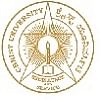BBA Honours Subjects and Syllabus

BBA Honours subjects consist of core and elective subjects focusing on equipping the students with knowledge related to Business Administration, Financial Operations, Business Operations, etc. The BBA Honours syllabus is divided into six semesters that span 3 years enriching the students with a comprehensive understanding of business administration concepts.
The core BBA Honours subjects include Financial Accounting, Macroeconomics, Business Statistics, Business Mathematics, Corporate Accounting, etc. Apart from the core subjects, students can also choose the elective subjects based on their choice such as Economics of Corruption, Advertisement Psychology, Entrepreneurial Leadership, Mutual Fund Services, etc.
The BBA Honours course also exposes the students to industrial visits, internships and projects along with a skill enhancement course to enhance their practical knowledge and skill set. BBA Honours job scope is vast as the students gain technical and industrial skills such as Analytical Skills, Communication Skills, Entrepreneurship mindset, etc to work in diverse industries and job roles.
Table of Contents
BBA Honours Subjects
The BBA Honours subjects focus on enriching students with the knowledge and skills related to business administration, fundamentals of marketing, business management and operations. BBA Honours subjects include core subjects, elective subjects, skill enhancement courses, discipline-specific electives and general electives.
Given below is the BBA Honours subject list along with the topics covered:
First-Year BBA Honours Subjects
The BBA Honours 1st year subjects cover topics such as Planning, Decision Making, Bank reconciliation statements, Accounting Systems, etc. Listed below are the BBA Honours subjects 1st year and the topics covered:
|
Subjects |
Topics Covered |
Type of Subject |
|
Principles of Management |
Planning, Decision Making, Organising, Staffing, Controlling and Supervision |
Core . |
|
Financial Accounting |
Accounting System and Process, Subsidiary Books, Bank Reconciliation Statement, Rectification of Errors |
|
|
Macroeconomics |
Basics of Supply and Demand, Elasticity and its Application, Theory of Consumer Behaviour, Market Efficiency and Externalities |
|
|
Business Mathematics |
Linear Models, System of Linear Equations And Matrices, Commercial Arithmetic, Calculus |
|
|
Organizational Behaviour |
Personality, Learning & Values, Perception, Group Dynamics, Organization Culture, Leadership |
|
|
Business Statistics |
Measures of Central Tendency, Measures of Dispersion and Skewness, Correlation and Regression |
|
|
Microeconomics |
Production and Growth, Goods and Money Market, Aggregate Demand, Aggregate Supply and Influence of Monetary and Fiscal Policy |
|
|
Corporate Accounting |
Final Accounts of Joint Stock Companies, Accounting for Issue of Shares and Debentures, Valuation of Goodwill |
|
|
Expressive Skills |
Art in Writing and Joy of Expression |
Skill Enhancement Course |
|
Social Sensitivity Skills |
Exchanging Culture, Relationship Building, Breaking Stereotypes |
|
|
Economics of Corruption |
Corruption, Poor Governance and Institutional Structure, Tackling Corruption |
General Elective |
|
Advertisement Psychology |
Cognitive processing of advertisements, International Advertising and Creating Brand, Introduction to Advertisement Psychology |
|
|
Global Leadership and Culture |
Global leaders and intercultural communication, Women leaders in global business, Leadership skills to make globalization work |
|
|
Economics and Literature |
Shelley's Radicalism: The Poet as Economist, The Capitalist Road: The Riddle of the Market from Karl Marx to Ben Okri |
Second-Year BBA Honours Subjects
The BBA Honours 2nd year subjects cover topics such as Capital Structure, Financial Management, Budget Management, Recruitment and Selection, Product Decision and Pricing, etc. Listed below are the BBA Hons second year subjects and the topics covered:
|
Subjects |
Topics Covered |
Type of Subject |
|
Financial Management |
Sources of finance and Capitalization, Capital Structure, Dividend Policy Decisions |
Core |
|
Human Resource Management |
Job Analysis and Human Resource Planning, Recruitment and Selection, Performance Appraisal & Compensation Management |
|
|
Marketing Management |
Connecting with Customers, Product Decisions, Pricing, and Distribution Channels |
|
|
Indian Financial Systems |
Capital Market, Money Market, Financial Institutions and Services |
|
|
Business Analytics |
Business Analytics Process, Data Visualisation, Predictive Modeling Techniques |
|
|
Cost and Management Accounting |
Material, Labor and Overheads, Marginal Costing, Budgetary control, Financial Statement Analysis |
|
|
Entrepreneurship Development |
Entrepreneurship Development in India, Creativity and Innovation, Business Plans, Project Management and Financing |
|
|
Research Methodology |
Research Process, Formulation of Research Problem and Hypotheses, Measurement Scales and Sampling Techniques |
|
|
Information System and E-Business |
Data Resource Management, Building Information Systems, E-Business and M-Commerce |
|
|
Company Law and Corporate Governance |
Formation of a Company, Company Management, Company Meetings, Internal Control Systems |
|
|
Knowledge Acquisition Skills |
Excel for Business: Essential and Excel for Business: Intermediate |
Skill Enhancement Course |
|
Knowledge Application Skills |
Creating data sets, Hypothesis Testing, Anova Testing, Regression Analysis |
|
|
Mutual Funds Services |
Fund Structure and Constituents, Mutual Fund Products and Services, Risk, Return and Performance of Funds |
General Elective |
|
Banking and Finance |
Relationship between Banker & Customer, Paying Banker, Principles & Procedures of Bank Lending |
|
|
Social Finance |
Micro Finance and Social Financial Inclusion, Social Enterprise and Impact Investing, Crowd Funding |
|
|
Entrepreneurial Leadership |
Developing Cognitive Ambidexterity, Leader as Social Architect, Ethical Leadership |
Third-Year BBA Honours Subjects
The subjects in BBA Honours 3rd year cover topics such as Globalisation, Residential Status And Incidence Of Tax, Income from Salary and Property, Production Planning And Control, etc. Listed below are the BBA Hons third year subjects and the topics covered:
|
Subjects |
Topics Covered |
Type of Subject |
|
International Business |
Modes Of Entering International Business, Globalization, International Marketing Intelligence |
Core |
|
Direct Taxes |
Residential Status And Incidence Of Tax, Income From Salary, Profits And Gains Of Business And Profession |
|
|
Strategic Management |
Environmental Analysis, Industry and Resource Analysis, Strategy Formulation And Choice |
|
|
Management Information System and Computing |
Data Resources, E-Business Application, Emerging Technologies In Business |
|
|
GST and Custom Duty |
Registration Under Gst, Supply Of Goods And Services: Place And Time, Value Of Taxable Supply |
|
|
Production Management |
Plant Location And Layout, Materials Management And Handling, Production Planning And Control |
|
|
Business Law |
Contract Of Guarantee, Intellectual Property Laws, Competition Law |
|
|
International Human Resource Management |
Comparative Human Resource Management, International Assignment, Multinational Companies And The Host Country Environment |
Discipline Specific Elective |
|
Global Business Finance |
International Monetary System, Foreign Exchange Markets, International Corporation And Capital Budgeting |
|
|
Financial Modelling and Derivative |
Valuation Modelling, Mergers And Acquisitions Modelling, Equity Research Modelling |
|
|
Organisation Developement |
Understanding The Od Process, Developing Excellence In Individuals, Strategic Intervention |
Semester Wise BBA Honours Syllabus
The BBA Honours syllabus structure varies depending on the college or university however the concepts and the subjects covered remain the same. To view a specific college syllabus, students can visit the college's official website and download the BBA Honours Syllabus PDF 2024. Given below is the BBA Honours subjects semester-wise:
BBA Honours First Year Syllabus
The BBA Honours syllabus 1st year covers subjects such as Financial Accounting, Business Mathematics, Principles of Management, Corporate Accounting, etc. Listed below is the BBA Hons 1st year syllabus:
|
Semester-I |
Semester-II |
|
Principles of Management |
Organizational Behaviour |
|
Financial Accounting |
Business Statistics |
|
Macroeconomics |
Microeconomics |
|
Business Mathematics |
Corporate Accounting |
|
Skill Enhancement Course |
Skill Enhancement Course |
|
General Elective |
General Elective |
|
General Elective |
General Elective |
BBA Honours Second Year Syllabus
The BBA Honours syllabus 2nd year focuses on subjects such as Human Resource Management, Business Analytics, Information Systems and E-Business, Cost and Management Accounting, etc. Given below is the BBA Hons 2nd year syllabus for 3rd and 4th semesters:
|
Semester-III |
Semester-IV |
|
Financial Management |
Cost and Management Accounting |
|
Human Resource Management |
Entrepreneurship Development |
|
Marketing Management |
Research Methodology |
|
Indian Financial Systems |
Information System and E-Business |
|
Business Analytics |
Company Law and Corporate Governance |
|
Skill Enhancement Course |
Skill Enhancement Course |
|
General Elective |
General Elective |
|
General Elective |
General Elective |
BBA Honours Third Year Syllabus
The BBA Honours syllabus 3rd year includes subjects such as Direct Taxes, International Business, Business Law, GST and Custom Duty, etc. Listed below are the BBA Hons 5th and 6th sem syllabus:
|
Semester-V |
Semester-VI |
|
International Business |
GST and Custom Duty |
|
Direct Taxes |
Production Management |
|
Strategic Management |
Business Law |
|
Management Information System and Computing |
Discipline Specific Elective |
|
Discipline Specific Elective |
Discipline Specific Elective |
|
Discipline Specific Elective |
Viva Voce |
|
Project |
Project/ Internship |
BBA Honours Course Structure
The BBA Hons subjects are structured to give students plenty of industry exposure and training. The curriculum is designed to give students a thorough understanding of the BBA Honours courses. The course outline is provided below:
- VI Semesters
- Core and Elective Subjects
- Conferences
- Seminars
- Business Events
- Industry Visits
- Internship
- Project Submission
BBA Honours Teaching Methodology and Techniques
BBA Hons course takes into account different training methods which include seminars, interactive classroom sessions, certification programs and case studies analysis The following teaching methods are used in the BBA Honours course:
- Classroom Study & Discussion
- Industry Connect
- Guest Lectures
- Internships: Summer Training
BBA Hons Project Topics
BBA Hons projects are worked on in groups throughout the final academic year and give students the chance to apply all their skills learned in class. Listed below are the popular BBA Hons Project topics:
- HRIS Role in Strategic Management
- Brand Analysis and Study of Relationship with Brand Image and Brand Awareness
- The Anatomy of Financial Crisis in India
- Segmentation, Targeting, and Positioning of IKEA
- Strategic Plans of SMEs
- Impact of Demonetisation on Central Bank (RBI) Autonomy in India
- The Development of a Unified Payments Interface System
BBA Honours Books
The reference books for BBA Honours are available to students in the form of paperbacks and PDF formats from popular authors and publications to help students obtain additional knowledge apart from the contents covered in the BBA Hons syllabus.
Given below is the year-wise BBA Hons reference books:
First Year BBA Honours Books
The BBA Hons first year books extensively cover topics such as Principles of Management, Business Mathematics, Advanced Accountancy, etc. Listed below are the BBA Hons 1st year books:
|
Books |
Topics Covered |
Author |
|
Business Mathematics |
Arithmetic and Elementary Algebra, Mathematics of Finance, Mathematics of Banking |
Sharma, J. K. |
|
Business Statistics |
Data Collection and Presentation, Measures of Central Tendency, Correlation and Regression Analysis |
Bajpai, N. |
|
Principles of Management |
Planning, Organising, Controlling, Leading, Decision Making |
Daft, R. L. |
|
Advanced Accountancy |
Profit or Loss Prior to Incorporation, Financial Statements of Banking Companies, Internal Reconstruction |
Maheshwari, S.N |
Second Year BBA Honours Books
The BBA Hons 2nd year reference books include contents related to Statistics, Corporate Accounting, Macroeconomics, etc. Listed below are the BBA Hons 2nd year books:
|
Books |
Topics Covered |
Author |
|
Organizational Behaviour |
Individual Behavior in Organizations, Attitude and Perception, Group Dynamics |
Aswathappa, K |
|
Statistics, Theory and Practice |
Probability Theory, Hypothesis Testing, Analysis of Variance |
Pillai &Bagavathi |
|
Macroeconomics: Theories and Policies |
Aggregate Demand and Aggregate Supply, Consumption and Investment, The Keynesian Model |
Froyen. R |
|
Corporate Accounting |
Accounting Standards and Policies, Cash Flow Statement, Corporate Financial Reporting |
Gupta, R.L., & Radhaswamy.M |
Third Year BBA Honours Books
The BBA Hons 3rd year books focus on topics such as Income Tax, International Business, Strategic Planning, etc. Listed below are the BBA Hons 3rd year books:
|
Books |
Topics Covered |
Author |
|
International Business |
International Trade Theories, International Economic Institutions, Foreign Exchange Markets |
Rakesh, M. J. |
|
Income Tax Law and Practice |
Computation of Total Income, Residential Status and Incidence of Tax, Tax Planning and Management |
Gaur, V.P.& Narang, B.K |
|
Strategic Management |
Strategic Planning Process, Strategic Alliances, Mergers, and Acquisitions |
Amason, A.C. |
|
Management Information Systems |
Information Systems for Decision Making, Enterprise System, E-Business and E-Commerce |
Murthy. C.S.V |
Top BBA {Hons.} Colleges
Top Management Entrance Exams
BBA {Hons.} Fee Structure
FAQs on BBA {Hons.} Syllabus and Subjects
Q: What is the subject of BBA Honours?
Q: Is BBA Honours better than BBA?
Q: Is there maths in BBA Hons?
Q: How is BBA different from BBA Hons?
Q: Are there opportunities for research or independent study in the BBA Honours course?
Q: What teaching methods and resources are used in BBA Honours courses?
Q: Is there a mandatory internship in the BBA Honours program?
Q: What is the assessment structure for subjects in the BBA Honours program?
Q: Is there any specialisation available under BBA Honours syllabus?
Q: What are some emerging trends in the business landscape taught in BBA hons course?
























